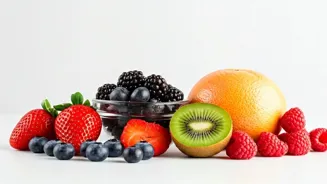Understanding Blood Sugar
Managing blood sugar is a critical aspect of health, especially for individuals grappling with diabetes or prediabetes. Stable blood sugar levels are essential
for preventing the onset of health complications. Many fruits are considered safe for diabetic patients because they offer a balanced mix of carbohydrates, fiber, and natural sugars. Fiber plays a crucial role by slowing down the absorption of sugar, thus preventing sudden spikes in blood glucose. These fruits also possess vitamins, minerals, and antioxidants that are beneficial for overall health. Considering these aspects, incorporating fruits with a low glycemic index into your daily diet is a beneficial choice for managing blood sugar levels and improving your health. Regular monitoring of blood sugar and consulting with a healthcare professional are always recommended.
Guava: The Superstar
Guava stands out as a fruit offering significant benefits for blood sugar management. This tropical fruit is rich in fiber and low in the glycemic index, meaning it releases sugar slowly into the bloodstream, thereby avoiding sharp spikes in glucose levels. High fiber content aids in digestion and supports stable blood sugar, which is particularly important for diabetic patients. The presence of antioxidants such as Vitamin C in guava also provides additional health advantages, protecting against free radicals and boosting the immune system. Eating guava may also contribute to improved insulin sensitivity. It makes guava a nutritious and delicious choice for anyone concerned about their blood sugar levels. Enjoy guava in moderation as part of a balanced diet and consider consulting a healthcare provider for personalized dietary recommendations.
Jamun: The Ayurvedic Choice
Jamun, also known as the Indian blackberry, has long been recognized in Ayurvedic medicine for its antidiabetic properties. It is traditionally used to help manage blood sugar levels. Jamun contains compounds that help lower blood sugar levels by improving insulin sensitivity and reducing the rate at which sugar is absorbed into the blood. The low glycemic index further helps in preventing blood sugar spikes. This fruit is rich in antioxidants and possesses properties that promote overall health. Consumption of jamun can have a beneficial effect on people with diabetes and prediabetes. It can be eaten fresh, added to smoothies, or enjoyed as part of a well-rounded meal plan. However, while jamun can be a valuable addition to a diabetic diet, remember to monitor your blood sugar levels regularly and consult a healthcare professional.
Apples: Daily Dose
Apples are a widely available and versatile fruit that is a good option for diabetic individuals. They are rich in fiber, especially soluble fiber, which slows down the absorption of sugar and prevents blood sugar spikes. Apples have a relatively low glycemic index. This makes them a suitable option for those managing their blood sugar levels. They also contain important vitamins, minerals, and antioxidants, which benefit overall health. The regular inclusion of apples in the diet can contribute to overall health and well-being, making them an ideal choice for managing blood sugar. Including apples in your meal plan is relatively easy: they can be eaten raw, added to salads, or used in healthy recipes. As with all fruits, moderate consumption and monitoring of blood sugar levels are advised.
Berries: The Tiny Giants
Berries are nutritional powerhouses, making them excellent for blood sugar management. Berries like blueberries, strawberries, raspberries, and blackberries are packed with fiber and antioxidants, both of which play an important role in blood sugar control. Fiber helps slow down sugar absorption and prevents spikes, while antioxidants combat inflammation and oxidative stress. These fruits have a low glycemic index, further helping in stable blood sugar management. Berries also provide various vitamins, minerals, and phytonutrients, supporting general health. Their natural sweetness and low impact on blood sugar make berries an excellent option for anyone trying to control their blood sugar levels. Berries can be added to your daily meals and snacks by adding them to your breakfast cereal, having them as a snack, or adding them to desserts. Remember to eat them in moderation as a part of a balanced diet.
Pears: Delicious and Nutritious
Pears, like apples, are another accessible and helpful fruit for people with diabetes. They contain a good amount of fiber, particularly in their skin, which helps reduce blood sugar spikes by slowing down digestion and sugar absorption. Pears possess a moderate glycemic index, making them a suitable choice when included in a balanced diet. This fruit also offers vitamins, minerals, and antioxidants. Choosing pears as a snack or adding them to meals can be a simple way to support blood sugar management. As with all fruits, the key is portion control and monitoring your blood sugar. The skin of the pear is particularly high in fiber and nutrients. Enjoying pears in moderation is a smart move toward maintaining stable blood sugar levels and overall well-being.
Kiwi: The Exotic Choice
Kiwi fruit is a nutrient-dense option that can contribute to blood sugar control. They have a low glycemic index, which helps prevent blood sugar spikes. They are rich in fiber, which slows the absorption of sugars and helps keep blood sugar levels stable. Moreover, kiwis are loaded with vitamins, particularly vitamin C and antioxidants, which support overall health and well-being. Regularly consuming kiwis can be beneficial as part of a diabetic diet. Kiwis are also known for their distinctive flavor and can be eaten fresh or incorporated into salads or smoothies. Be mindful of portion sizes, and consult your doctor or dietician for personalized advice. Kiwi is a delicious, healthy option that is beneficial for managing blood sugar levels while also being good for your health.












